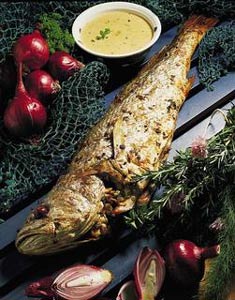 |
The Afrikaner kitchen
South African dried fruit is as famous as its dried
meat, and South African preserves are unbeatable. Claimed by everyone but
probably handed down by the Afrikaners' French forebears, preserves, known as
konfyt - probably from the French confiture - feature jewel-like pieces of
watermelon rind, quince or other hard fruit, soaked in lime water, then
cooked in sugar syrup and spices, presented in syrup and eaten on their
own. Green fig is one of the best-known and most delicious, steeped in a
syrup seasoned with cinnamon and dried ginger.
South African puddings generally are superb, and extremely sweet, and the
legacy of all its inhabitants, from English trifle to Afrikaner melktert.
So, to some extent, are the foods most commonly attributed to the
Afrikaner: based on Dutch cuisine, with contributions from French and
German immigrant communities, with a large dollop of Cape Malay, and
tempered by decades of trekking.
Potjiekos, for example, says
food writer and restaurateur Peter Veldsman,
who invented the term, has been part of South African life since the first
settlement at the Cape. "In those days, food was cooked in an open hearth
in the kitchen in a black cast-iron pot with legs so that the coals could
be scraped under the pot," he notes in Flavours of South Africa. Later,
meat, vegetables and spices piled into a three-legged iron pot and cooked
for quite a long time over a fire was the perfect way for trek farmers to
keep body and soul together. When camp was made, game was stewed, or
mutton, goat or old oxen; the pot, its contents protected by a heavy layer
of fat, was hooked under the wagon when camp was struck, then unhooked at
the next stop and put on the fire.
The Afrikaner's traditional way with vegetables and fruit - baked pumpkin
sweetened with golden syrup or honey, spiced sun-dried peaches stewed with cinnamon,
cloves, allspice and sugar, or baby marrows and braised onions
- all
brighten a meal.
Boerewors - farmers' sausage - is another standard Afrikaner dish, the
legacy of German settlers who, with - largely - Dutch and French immigrants,
formed Afrikaner ancestry. Exceptionally fat, boerewors, an essential at
any braai, is made usually of beef, pork, coriander and other spices.


|  |
 |

 |
 |
 |
 |
Besides a national passion for prawns, South Africans show a fondness for an odd fish called the kingklip - baked, deep-fried, grilled or pan-fried (Photo: Government Communications) |
 |
|






